Analysis of Brexit's Impact on Australian Financial Markets (MAF202)
VerifiedAdded on 2022/10/12
|11
|2871
|270
Report
AI Summary
This report examines the implications of Brexit on the Australian financial market. It begins by defining "no-deal Brexit" and outlining its causes and impacts on the European Union and the international community. The report then analyzes the short-term impacts of Brexit on the Australian financial market, including market volatility, asset price declines, and the responses of Australian authorities, such as the ASIC and the RBA. The long-term impacts, including the government's role and the responses of regulatory bodies, are also considered. The report discusses the treasurer's statement and the evaluation of the CFR's statement, concluding with an assessment of the resilience of Australian banks in managing the negative impacts of Brexit. The analysis highlights the interconnectedness of global markets and the importance of proactive financial policies.

1
Money and capital
Money and capital
Paraphrase This Document
Need a fresh take? Get an instant paraphrase of this document with our AI Paraphraser
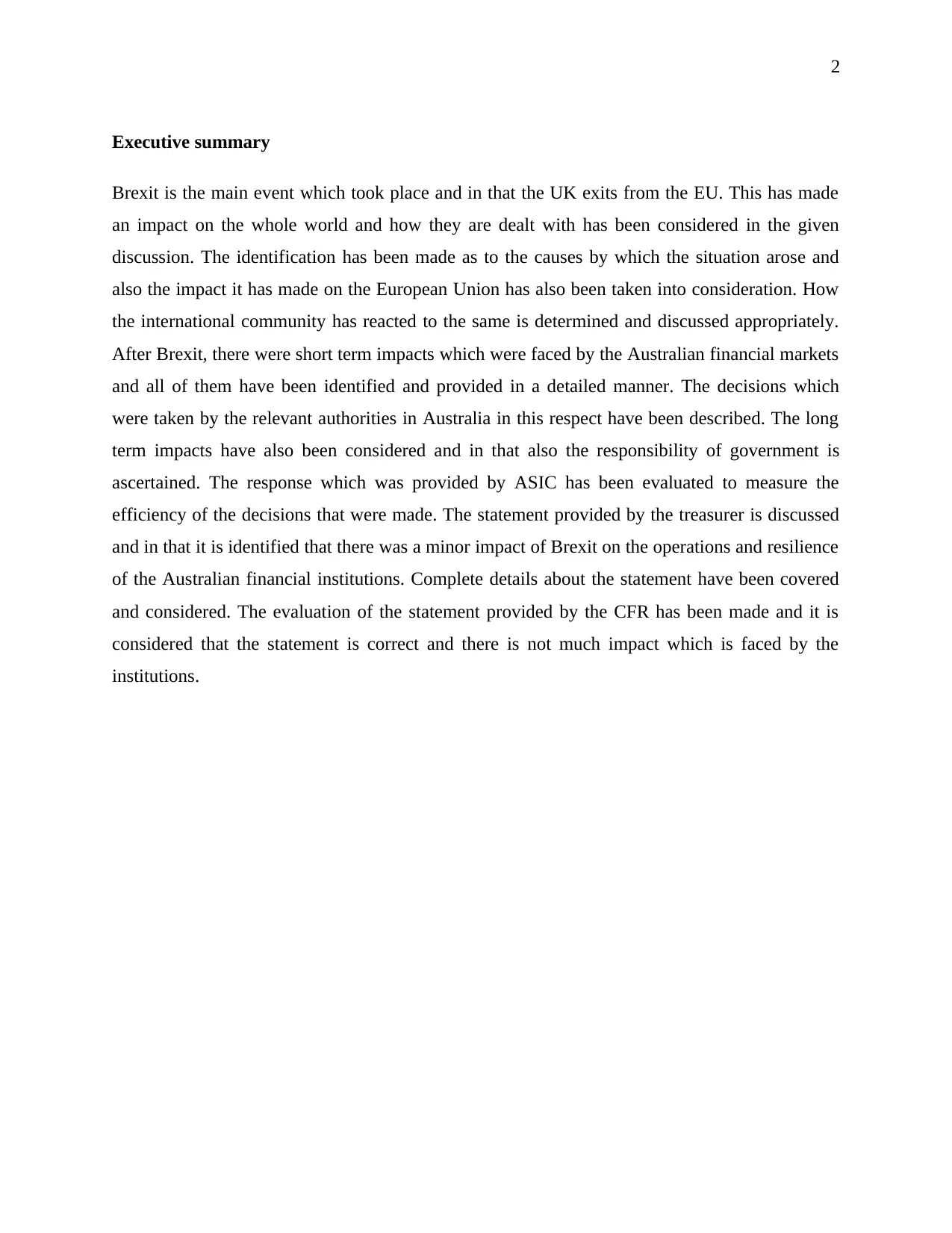
2
Executive summary
Brexit is the main event which took place and in that the UK exits from the EU. This has made
an impact on the whole world and how they are dealt with has been considered in the given
discussion. The identification has been made as to the causes by which the situation arose and
also the impact it has made on the European Union has also been taken into consideration. How
the international community has reacted to the same is determined and discussed appropriately.
After Brexit, there were short term impacts which were faced by the Australian financial markets
and all of them have been identified and provided in a detailed manner. The decisions which
were taken by the relevant authorities in Australia in this respect have been described. The long
term impacts have also been considered and in that also the responsibility of government is
ascertained. The response which was provided by ASIC has been evaluated to measure the
efficiency of the decisions that were made. The statement provided by the treasurer is discussed
and in that it is identified that there was a minor impact of Brexit on the operations and resilience
of the Australian financial institutions. Complete details about the statement have been covered
and considered. The evaluation of the statement provided by the CFR has been made and it is
considered that the statement is correct and there is not much impact which is faced by the
institutions.
Executive summary
Brexit is the main event which took place and in that the UK exits from the EU. This has made
an impact on the whole world and how they are dealt with has been considered in the given
discussion. The identification has been made as to the causes by which the situation arose and
also the impact it has made on the European Union has also been taken into consideration. How
the international community has reacted to the same is determined and discussed appropriately.
After Brexit, there were short term impacts which were faced by the Australian financial markets
and all of them have been identified and provided in a detailed manner. The decisions which
were taken by the relevant authorities in Australia in this respect have been described. The long
term impacts have also been considered and in that also the responsibility of government is
ascertained. The response which was provided by ASIC has been evaluated to measure the
efficiency of the decisions that were made. The statement provided by the treasurer is discussed
and in that it is identified that there was a minor impact of Brexit on the operations and resilience
of the Australian financial institutions. Complete details about the statement have been covered
and considered. The evaluation of the statement provided by the CFR has been made and it is
considered that the statement is correct and there is not much impact which is faced by the
institutions.
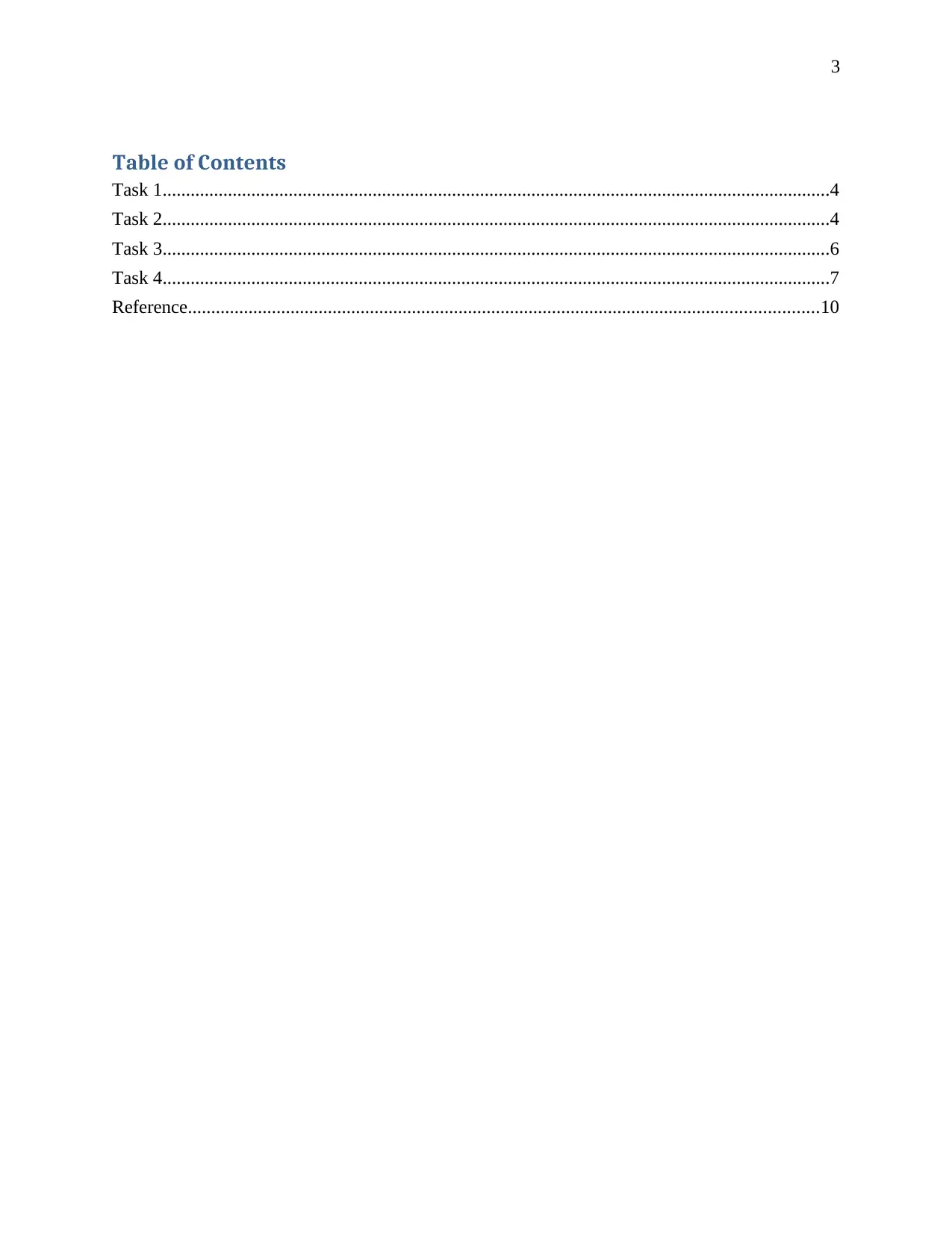
3
Table of Contents
Task 1...............................................................................................................................................4
Task 2...............................................................................................................................................4
Task 3...............................................................................................................................................6
Task 4...............................................................................................................................................7
Reference.......................................................................................................................................10
Table of Contents
Task 1...............................................................................................................................................4
Task 2...............................................................................................................................................4
Task 3...............................................................................................................................................6
Task 4...............................................................................................................................................7
Reference.......................................................................................................................................10
⊘ This is a preview!⊘
Do you want full access?
Subscribe today to unlock all pages.

Trusted by 1+ million students worldwide
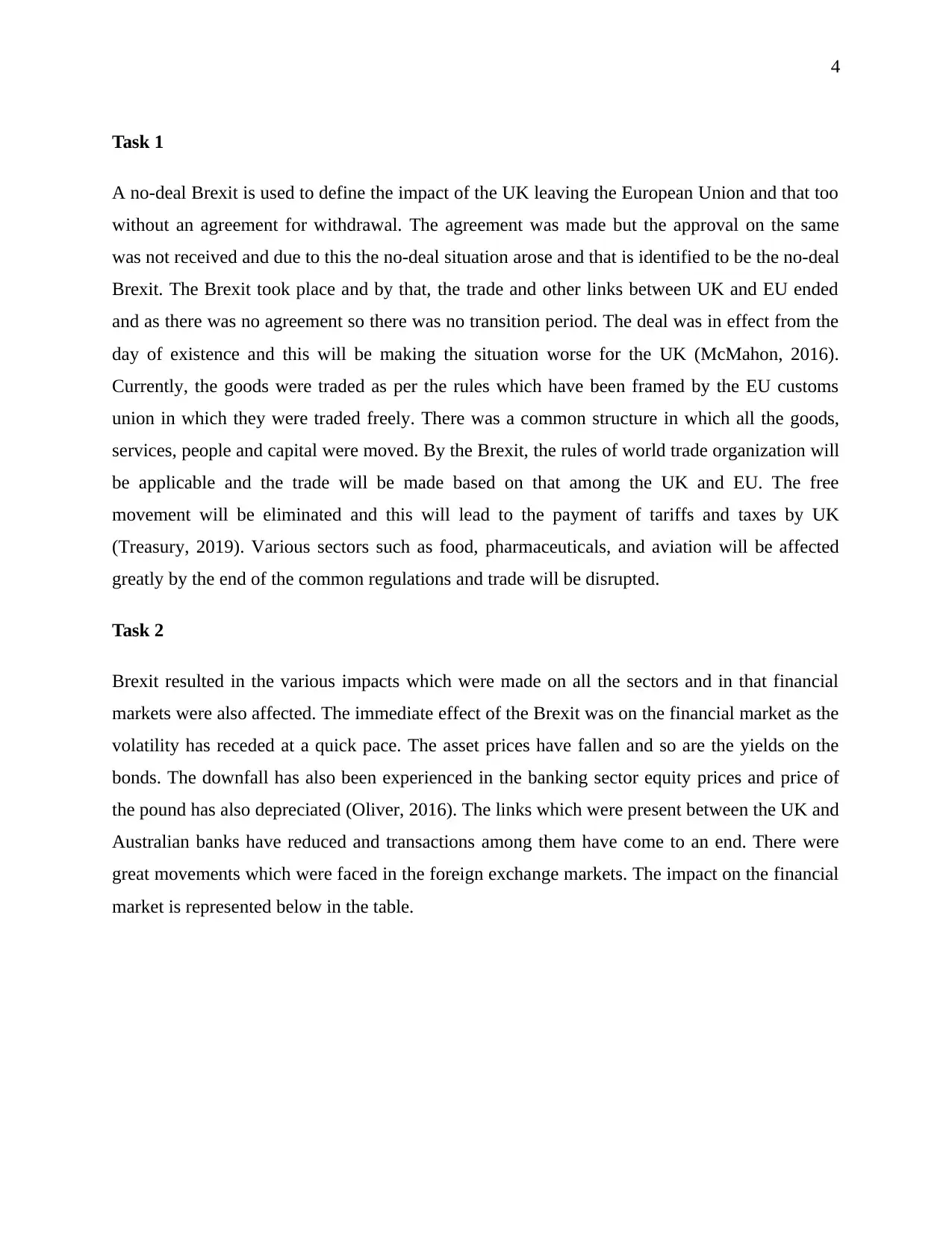
4
Task 1
A no-deal Brexit is used to define the impact of the UK leaving the European Union and that too
without an agreement for withdrawal. The agreement was made but the approval on the same
was not received and due to this the no-deal situation arose and that is identified to be the no-deal
Brexit. The Brexit took place and by that, the trade and other links between UK and EU ended
and as there was no agreement so there was no transition period. The deal was in effect from the
day of existence and this will be making the situation worse for the UK (McMahon, 2016).
Currently, the goods were traded as per the rules which have been framed by the EU customs
union in which they were traded freely. There was a common structure in which all the goods,
services, people and capital were moved. By the Brexit, the rules of world trade organization will
be applicable and the trade will be made based on that among the UK and EU. The free
movement will be eliminated and this will lead to the payment of tariffs and taxes by UK
(Treasury, 2019). Various sectors such as food, pharmaceuticals, and aviation will be affected
greatly by the end of the common regulations and trade will be disrupted.
Task 2
Brexit resulted in the various impacts which were made on all the sectors and in that financial
markets were also affected. The immediate effect of the Brexit was on the financial market as the
volatility has receded at a quick pace. The asset prices have fallen and so are the yields on the
bonds. The downfall has also been experienced in the banking sector equity prices and price of
the pound has also depreciated (Oliver, 2016). The links which were present between the UK and
Australian banks have reduced and transactions among them have come to an end. There were
great movements which were faced in the foreign exchange markets. The impact on the financial
market is represented below in the table.
Task 1
A no-deal Brexit is used to define the impact of the UK leaving the European Union and that too
without an agreement for withdrawal. The agreement was made but the approval on the same
was not received and due to this the no-deal situation arose and that is identified to be the no-deal
Brexit. The Brexit took place and by that, the trade and other links between UK and EU ended
and as there was no agreement so there was no transition period. The deal was in effect from the
day of existence and this will be making the situation worse for the UK (McMahon, 2016).
Currently, the goods were traded as per the rules which have been framed by the EU customs
union in which they were traded freely. There was a common structure in which all the goods,
services, people and capital were moved. By the Brexit, the rules of world trade organization will
be applicable and the trade will be made based on that among the UK and EU. The free
movement will be eliminated and this will lead to the payment of tariffs and taxes by UK
(Treasury, 2019). Various sectors such as food, pharmaceuticals, and aviation will be affected
greatly by the end of the common regulations and trade will be disrupted.
Task 2
Brexit resulted in the various impacts which were made on all the sectors and in that financial
markets were also affected. The immediate effect of the Brexit was on the financial market as the
volatility has receded at a quick pace. The asset prices have fallen and so are the yields on the
bonds. The downfall has also been experienced in the banking sector equity prices and price of
the pound has also depreciated (Oliver, 2016). The links which were present between the UK and
Australian banks have reduced and transactions among them have come to an end. There were
great movements which were faced in the foreign exchange markets. The impact on the financial
market is represented below in the table.
Paraphrase This Document
Need a fresh take? Get an instant paraphrase of this document with our AI Paraphraser
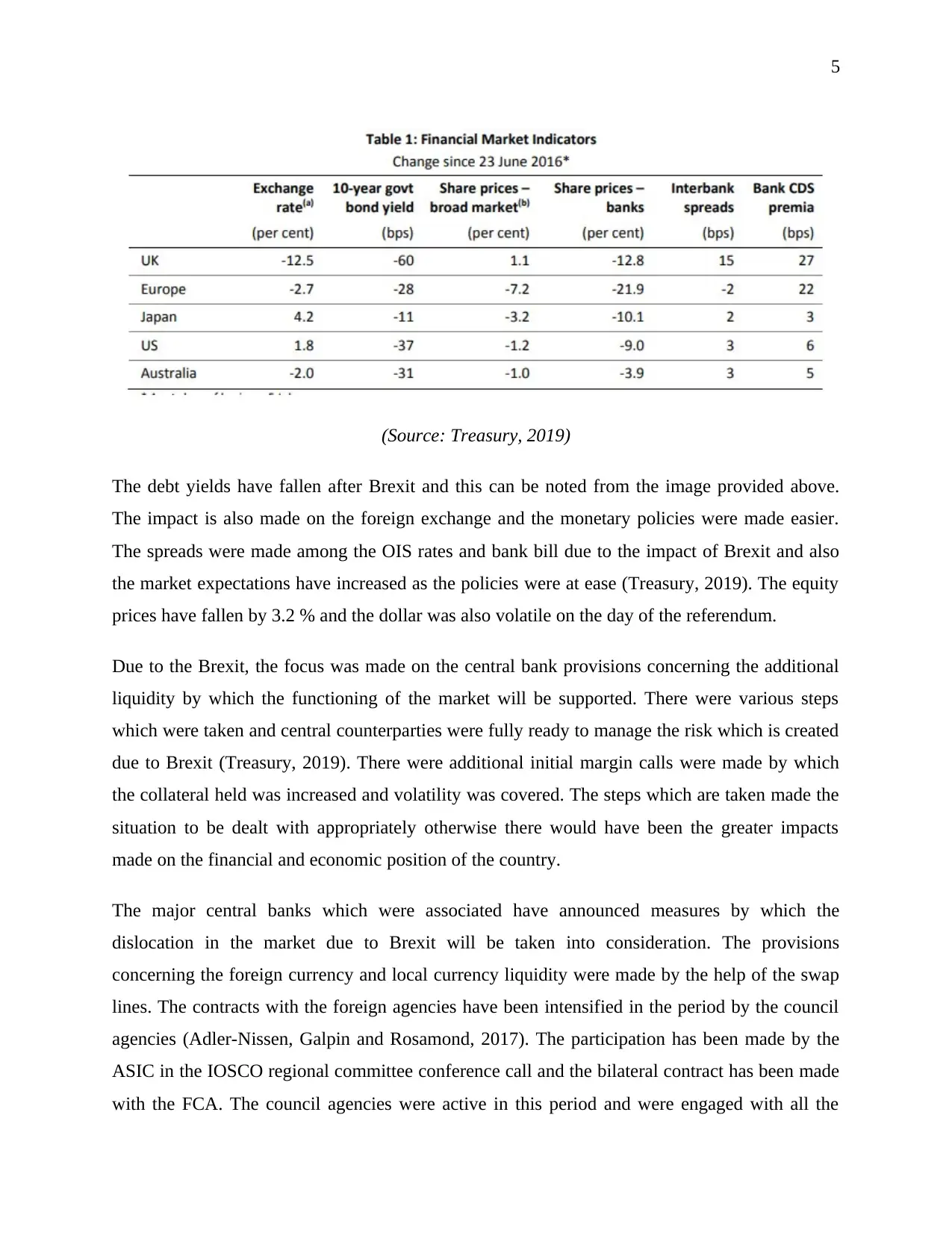
5
(Source: Treasury, 2019)
The debt yields have fallen after Brexit and this can be noted from the image provided above.
The impact is also made on the foreign exchange and the monetary policies were made easier.
The spreads were made among the OIS rates and bank bill due to the impact of Brexit and also
the market expectations have increased as the policies were at ease (Treasury, 2019). The equity
prices have fallen by 3.2 % and the dollar was also volatile on the day of the referendum.
Due to the Brexit, the focus was made on the central bank provisions concerning the additional
liquidity by which the functioning of the market will be supported. There were various steps
which were taken and central counterparties were fully ready to manage the risk which is created
due to Brexit (Treasury, 2019). There were additional initial margin calls were made by which
the collateral held was increased and volatility was covered. The steps which are taken made the
situation to be dealt with appropriately otherwise there would have been the greater impacts
made on the financial and economic position of the country.
The major central banks which were associated have announced measures by which the
dislocation in the market due to Brexit will be taken into consideration. The provisions
concerning the foreign currency and local currency liquidity were made by the help of the swap
lines. The contracts with the foreign agencies have been intensified in the period by the council
agencies (Adler-Nissen, Galpin and Rosamond, 2017). The participation has been made by the
ASIC in the IOSCO regional committee conference call and the bilateral contract has been made
with the FCA. The council agencies were active in this period and were engaged with all the
(Source: Treasury, 2019)
The debt yields have fallen after Brexit and this can be noted from the image provided above.
The impact is also made on the foreign exchange and the monetary policies were made easier.
The spreads were made among the OIS rates and bank bill due to the impact of Brexit and also
the market expectations have increased as the policies were at ease (Treasury, 2019). The equity
prices have fallen by 3.2 % and the dollar was also volatile on the day of the referendum.
Due to the Brexit, the focus was made on the central bank provisions concerning the additional
liquidity by which the functioning of the market will be supported. There were various steps
which were taken and central counterparties were fully ready to manage the risk which is created
due to Brexit (Treasury, 2019). There were additional initial margin calls were made by which
the collateral held was increased and volatility was covered. The steps which are taken made the
situation to be dealt with appropriately otherwise there would have been the greater impacts
made on the financial and economic position of the country.
The major central banks which were associated have announced measures by which the
dislocation in the market due to Brexit will be taken into consideration. The provisions
concerning the foreign currency and local currency liquidity were made by the help of the swap
lines. The contracts with the foreign agencies have been intensified in the period by the council
agencies (Adler-Nissen, Galpin and Rosamond, 2017). The participation has been made by the
ASIC in the IOSCO regional committee conference call and the bilateral contract has been made
with the FCA. The council agencies were active in this period and were engaged with all the
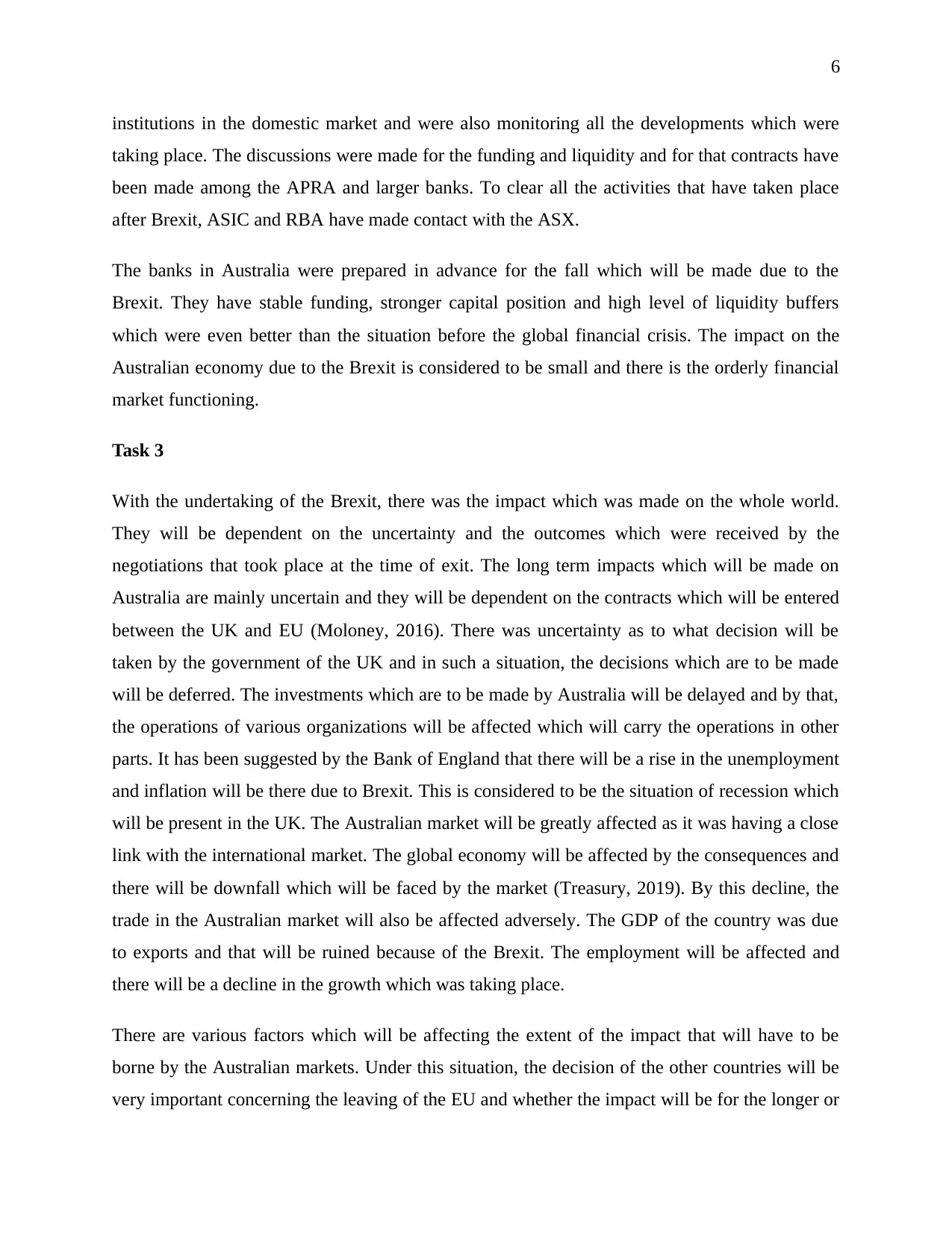
6
institutions in the domestic market and were also monitoring all the developments which were
taking place. The discussions were made for the funding and liquidity and for that contracts have
been made among the APRA and larger banks. To clear all the activities that have taken place
after Brexit, ASIC and RBA have made contact with the ASX.
The banks in Australia were prepared in advance for the fall which will be made due to the
Brexit. They have stable funding, stronger capital position and high level of liquidity buffers
which were even better than the situation before the global financial crisis. The impact on the
Australian economy due to the Brexit is considered to be small and there is the orderly financial
market functioning.
Task 3
With the undertaking of the Brexit, there was the impact which was made on the whole world.
They will be dependent on the uncertainty and the outcomes which were received by the
negotiations that took place at the time of exit. The long term impacts which will be made on
Australia are mainly uncertain and they will be dependent on the contracts which will be entered
between the UK and EU (Moloney, 2016). There was uncertainty as to what decision will be
taken by the government of the UK and in such a situation, the decisions which are to be made
will be deferred. The investments which are to be made by Australia will be delayed and by that,
the operations of various organizations will be affected which will carry the operations in other
parts. It has been suggested by the Bank of England that there will be a rise in the unemployment
and inflation will be there due to Brexit. This is considered to be the situation of recession which
will be present in the UK. The Australian market will be greatly affected as it was having a close
link with the international market. The global economy will be affected by the consequences and
there will be downfall which will be faced by the market (Treasury, 2019). By this decline, the
trade in the Australian market will also be affected adversely. The GDP of the country was due
to exports and that will be ruined because of the Brexit. The employment will be affected and
there will be a decline in the growth which was taking place.
There are various factors which will be affecting the extent of the impact that will have to be
borne by the Australian markets. Under this situation, the decision of the other countries will be
very important concerning the leaving of the EU and whether the impact will be for the longer or
institutions in the domestic market and were also monitoring all the developments which were
taking place. The discussions were made for the funding and liquidity and for that contracts have
been made among the APRA and larger banks. To clear all the activities that have taken place
after Brexit, ASIC and RBA have made contact with the ASX.
The banks in Australia were prepared in advance for the fall which will be made due to the
Brexit. They have stable funding, stronger capital position and high level of liquidity buffers
which were even better than the situation before the global financial crisis. The impact on the
Australian economy due to the Brexit is considered to be small and there is the orderly financial
market functioning.
Task 3
With the undertaking of the Brexit, there was the impact which was made on the whole world.
They will be dependent on the uncertainty and the outcomes which were received by the
negotiations that took place at the time of exit. The long term impacts which will be made on
Australia are mainly uncertain and they will be dependent on the contracts which will be entered
between the UK and EU (Moloney, 2016). There was uncertainty as to what decision will be
taken by the government of the UK and in such a situation, the decisions which are to be made
will be deferred. The investments which are to be made by Australia will be delayed and by that,
the operations of various organizations will be affected which will carry the operations in other
parts. It has been suggested by the Bank of England that there will be a rise in the unemployment
and inflation will be there due to Brexit. This is considered to be the situation of recession which
will be present in the UK. The Australian market will be greatly affected as it was having a close
link with the international market. The global economy will be affected by the consequences and
there will be downfall which will be faced by the market (Treasury, 2019). By this decline, the
trade in the Australian market will also be affected adversely. The GDP of the country was due
to exports and that will be ruined because of the Brexit. The employment will be affected and
there will be a decline in the growth which was taking place.
There are various factors which will be affecting the extent of the impact that will have to be
borne by the Australian markets. Under this situation, the decision of the other countries will be
very important concerning the leaving of the EU and whether the impact will be for the longer or
⊘ This is a preview!⊘
Do you want full access?
Subscribe today to unlock all pages.

Trusted by 1+ million students worldwide
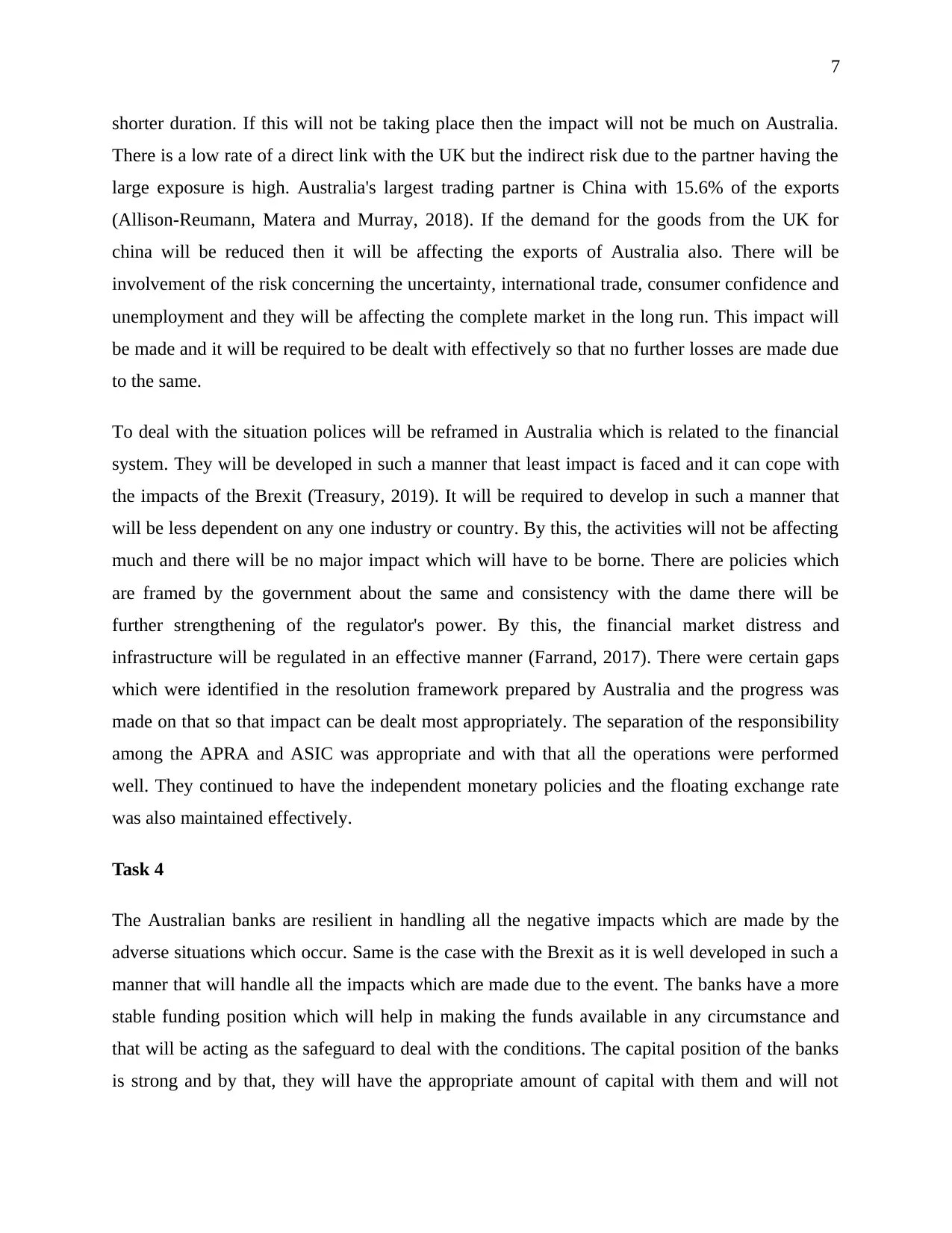
7
shorter duration. If this will not be taking place then the impact will not be much on Australia.
There is a low rate of a direct link with the UK but the indirect risk due to the partner having the
large exposure is high. Australia's largest trading partner is China with 15.6% of the exports
(Allison-Reumann, Matera and Murray, 2018). If the demand for the goods from the UK for
china will be reduced then it will be affecting the exports of Australia also. There will be
involvement of the risk concerning the uncertainty, international trade, consumer confidence and
unemployment and they will be affecting the complete market in the long run. This impact will
be made and it will be required to be dealt with effectively so that no further losses are made due
to the same.
To deal with the situation polices will be reframed in Australia which is related to the financial
system. They will be developed in such a manner that least impact is faced and it can cope with
the impacts of the Brexit (Treasury, 2019). It will be required to develop in such a manner that
will be less dependent on any one industry or country. By this, the activities will not be affecting
much and there will be no major impact which will have to be borne. There are policies which
are framed by the government about the same and consistency with the dame there will be
further strengthening of the regulator's power. By this, the financial market distress and
infrastructure will be regulated in an effective manner (Farrand, 2017). There were certain gaps
which were identified in the resolution framework prepared by Australia and the progress was
made on that so that impact can be dealt most appropriately. The separation of the responsibility
among the APRA and ASIC was appropriate and with that all the operations were performed
well. They continued to have the independent monetary policies and the floating exchange rate
was also maintained effectively.
Task 4
The Australian banks are resilient in handling all the negative impacts which are made by the
adverse situations which occur. Same is the case with the Brexit as it is well developed in such a
manner that will handle all the impacts which are made due to the event. The banks have a more
stable funding position which will help in making the funds available in any circumstance and
that will be acting as the safeguard to deal with the conditions. The capital position of the banks
is strong and by that, they will have the appropriate amount of capital with them and will not
shorter duration. If this will not be taking place then the impact will not be much on Australia.
There is a low rate of a direct link with the UK but the indirect risk due to the partner having the
large exposure is high. Australia's largest trading partner is China with 15.6% of the exports
(Allison-Reumann, Matera and Murray, 2018). If the demand for the goods from the UK for
china will be reduced then it will be affecting the exports of Australia also. There will be
involvement of the risk concerning the uncertainty, international trade, consumer confidence and
unemployment and they will be affecting the complete market in the long run. This impact will
be made and it will be required to be dealt with effectively so that no further losses are made due
to the same.
To deal with the situation polices will be reframed in Australia which is related to the financial
system. They will be developed in such a manner that least impact is faced and it can cope with
the impacts of the Brexit (Treasury, 2019). It will be required to develop in such a manner that
will be less dependent on any one industry or country. By this, the activities will not be affecting
much and there will be no major impact which will have to be borne. There are policies which
are framed by the government about the same and consistency with the dame there will be
further strengthening of the regulator's power. By this, the financial market distress and
infrastructure will be regulated in an effective manner (Farrand, 2017). There were certain gaps
which were identified in the resolution framework prepared by Australia and the progress was
made on that so that impact can be dealt most appropriately. The separation of the responsibility
among the APRA and ASIC was appropriate and with that all the operations were performed
well. They continued to have the independent monetary policies and the floating exchange rate
was also maintained effectively.
Task 4
The Australian banks are resilient in handling all the negative impacts which are made by the
adverse situations which occur. Same is the case with the Brexit as it is well developed in such a
manner that will handle all the impacts which are made due to the event. The banks have a more
stable funding position which will help in making the funds available in any circumstance and
that will be acting as the safeguard to deal with the conditions. The capital position of the banks
is strong and by that, they will have the appropriate amount of capital with them and will not
Paraphrase This Document
Need a fresh take? Get an instant paraphrase of this document with our AI Paraphraser
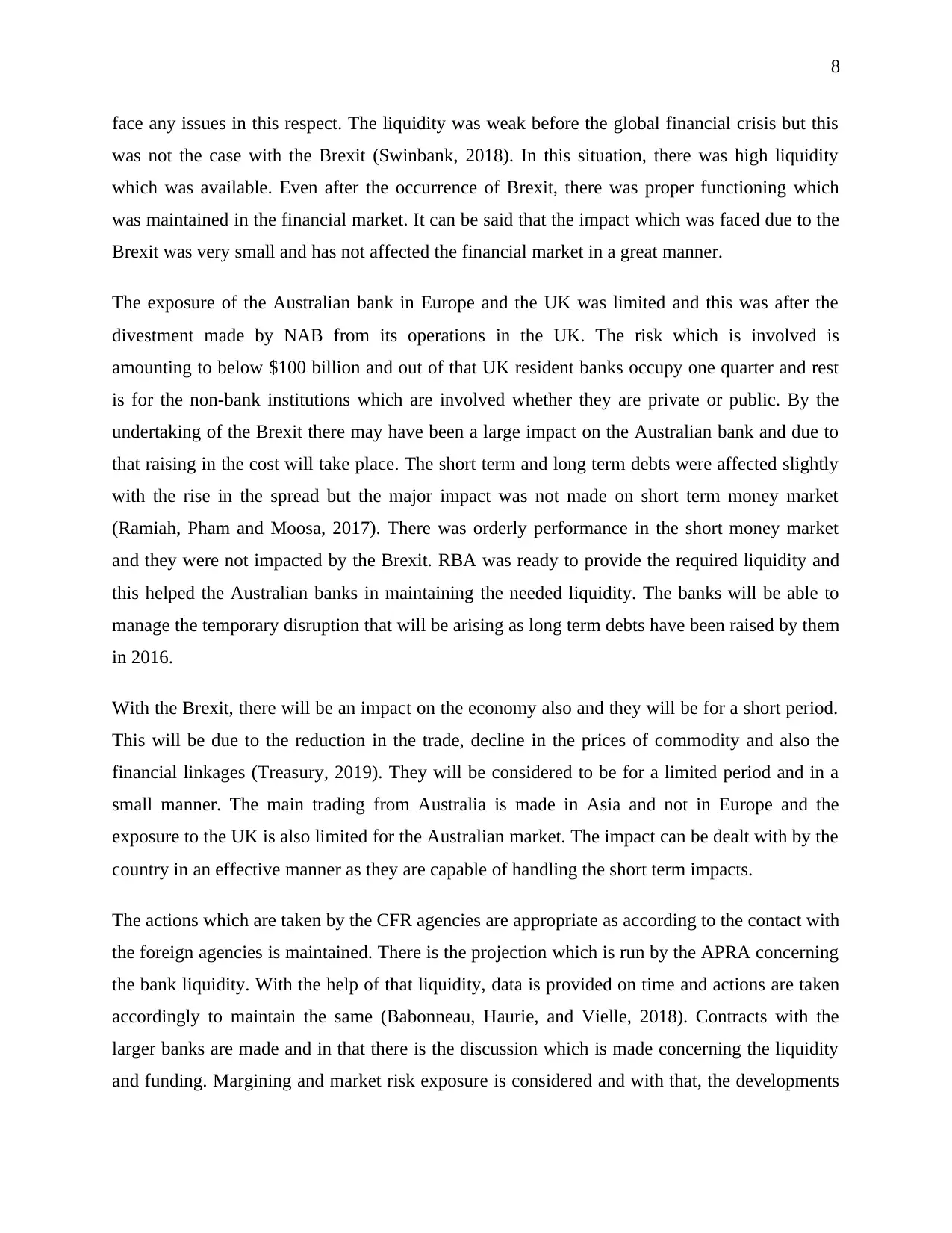
8
face any issues in this respect. The liquidity was weak before the global financial crisis but this
was not the case with the Brexit (Swinbank, 2018). In this situation, there was high liquidity
which was available. Even after the occurrence of Brexit, there was proper functioning which
was maintained in the financial market. It can be said that the impact which was faced due to the
Brexit was very small and has not affected the financial market in a great manner.
The exposure of the Australian bank in Europe and the UK was limited and this was after the
divestment made by NAB from its operations in the UK. The risk which is involved is
amounting to below $100 billion and out of that UK resident banks occupy one quarter and rest
is for the non-bank institutions which are involved whether they are private or public. By the
undertaking of the Brexit there may have been a large impact on the Australian bank and due to
that raising in the cost will take place. The short term and long term debts were affected slightly
with the rise in the spread but the major impact was not made on short term money market
(Ramiah, Pham and Moosa, 2017). There was orderly performance in the short money market
and they were not impacted by the Brexit. RBA was ready to provide the required liquidity and
this helped the Australian banks in maintaining the needed liquidity. The banks will be able to
manage the temporary disruption that will be arising as long term debts have been raised by them
in 2016.
With the Brexit, there will be an impact on the economy also and they will be for a short period.
This will be due to the reduction in the trade, decline in the prices of commodity and also the
financial linkages (Treasury, 2019). They will be considered to be for a limited period and in a
small manner. The main trading from Australia is made in Asia and not in Europe and the
exposure to the UK is also limited for the Australian market. The impact can be dealt with by the
country in an effective manner as they are capable of handling the short term impacts.
The actions which are taken by the CFR agencies are appropriate as according to the contact with
the foreign agencies is maintained. There is the projection which is run by the APRA concerning
the bank liquidity. With the help of that liquidity, data is provided on time and actions are taken
accordingly to maintain the same (Babonneau, Haurie, and Vielle, 2018). Contracts with the
larger banks are made and in that there is the discussion which is made concerning the liquidity
and funding. Margining and market risk exposure is considered and with that, the developments
face any issues in this respect. The liquidity was weak before the global financial crisis but this
was not the case with the Brexit (Swinbank, 2018). In this situation, there was high liquidity
which was available. Even after the occurrence of Brexit, there was proper functioning which
was maintained in the financial market. It can be said that the impact which was faced due to the
Brexit was very small and has not affected the financial market in a great manner.
The exposure of the Australian bank in Europe and the UK was limited and this was after the
divestment made by NAB from its operations in the UK. The risk which is involved is
amounting to below $100 billion and out of that UK resident banks occupy one quarter and rest
is for the non-bank institutions which are involved whether they are private or public. By the
undertaking of the Brexit there may have been a large impact on the Australian bank and due to
that raising in the cost will take place. The short term and long term debts were affected slightly
with the rise in the spread but the major impact was not made on short term money market
(Ramiah, Pham and Moosa, 2017). There was orderly performance in the short money market
and they were not impacted by the Brexit. RBA was ready to provide the required liquidity and
this helped the Australian banks in maintaining the needed liquidity. The banks will be able to
manage the temporary disruption that will be arising as long term debts have been raised by them
in 2016.
With the Brexit, there will be an impact on the economy also and they will be for a short period.
This will be due to the reduction in the trade, decline in the prices of commodity and also the
financial linkages (Treasury, 2019). They will be considered to be for a limited period and in a
small manner. The main trading from Australia is made in Asia and not in Europe and the
exposure to the UK is also limited for the Australian market. The impact can be dealt with by the
country in an effective manner as they are capable of handling the short term impacts.
The actions which are taken by the CFR agencies are appropriate as according to the contact with
the foreign agencies is maintained. There is the projection which is run by the APRA concerning
the bank liquidity. With the help of that liquidity, data is provided on time and actions are taken
accordingly to maintain the same (Babonneau, Haurie, and Vielle, 2018). Contracts with the
larger banks are made and in that there is the discussion which is made concerning the liquidity
and funding. Margining and market risk exposure is considered and with that, the developments

9
which are taking place in the offshore funding market are also taken into account. All of them
lead to the maintenance of the funding is adequate manner and there are no risks which are
involved with the Brexit and only small impacts are faced.
which are taking place in the offshore funding market are also taken into account. All of them
lead to the maintenance of the funding is adequate manner and there are no risks which are
involved with the Brexit and only small impacts are faced.
⊘ This is a preview!⊘
Do you want full access?
Subscribe today to unlock all pages.

Trusted by 1+ million students worldwide
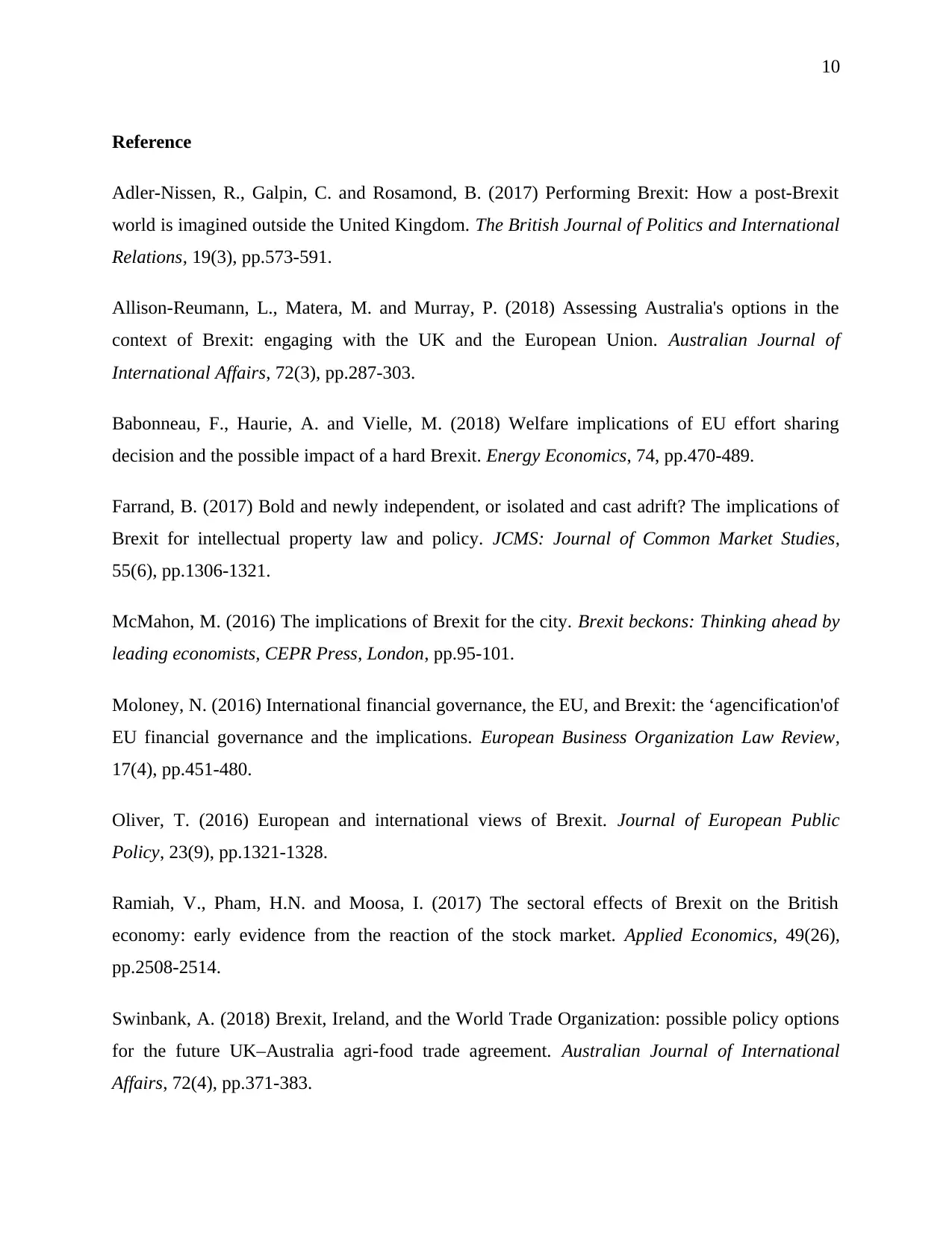
10
Reference
Adler-Nissen, R., Galpin, C. and Rosamond, B. (2017) Performing Brexit: How a post-Brexit
world is imagined outside the United Kingdom. The British Journal of Politics and International
Relations, 19(3), pp.573-591.
Allison-Reumann, L., Matera, M. and Murray, P. (2018) Assessing Australia's options in the
context of Brexit: engaging with the UK and the European Union. Australian Journal of
International Affairs, 72(3), pp.287-303.
Babonneau, F., Haurie, A. and Vielle, M. (2018) Welfare implications of EU effort sharing
decision and the possible impact of a hard Brexit. Energy Economics, 74, pp.470-489.
Farrand, B. (2017) Bold and newly independent, or isolated and cast adrift? The implications of
Brexit for intellectual property law and policy. JCMS: Journal of Common Market Studies,
55(6), pp.1306-1321.
McMahon, M. (2016) The implications of Brexit for the city. Brexit beckons: Thinking ahead by
leading economists, CEPR Press, London, pp.95-101.
Moloney, N. (2016) International financial governance, the EU, and Brexit: the ‘agencification'of
EU financial governance and the implications. European Business Organization Law Review,
17(4), pp.451-480.
Oliver, T. (2016) European and international views of Brexit. Journal of European Public
Policy, 23(9), pp.1321-1328.
Ramiah, V., Pham, H.N. and Moosa, I. (2017) The sectoral effects of Brexit on the British
economy: early evidence from the reaction of the stock market. Applied Economics, 49(26),
pp.2508-2514.
Swinbank, A. (2018) Brexit, Ireland, and the World Trade Organization: possible policy options
for the future UK–Australia agri-food trade agreement. Australian Journal of International
Affairs, 72(4), pp.371-383.
Reference
Adler-Nissen, R., Galpin, C. and Rosamond, B. (2017) Performing Brexit: How a post-Brexit
world is imagined outside the United Kingdom. The British Journal of Politics and International
Relations, 19(3), pp.573-591.
Allison-Reumann, L., Matera, M. and Murray, P. (2018) Assessing Australia's options in the
context of Brexit: engaging with the UK and the European Union. Australian Journal of
International Affairs, 72(3), pp.287-303.
Babonneau, F., Haurie, A. and Vielle, M. (2018) Welfare implications of EU effort sharing
decision and the possible impact of a hard Brexit. Energy Economics, 74, pp.470-489.
Farrand, B. (2017) Bold and newly independent, or isolated and cast adrift? The implications of
Brexit for intellectual property law and policy. JCMS: Journal of Common Market Studies,
55(6), pp.1306-1321.
McMahon, M. (2016) The implications of Brexit for the city. Brexit beckons: Thinking ahead by
leading economists, CEPR Press, London, pp.95-101.
Moloney, N. (2016) International financial governance, the EU, and Brexit: the ‘agencification'of
EU financial governance and the implications. European Business Organization Law Review,
17(4), pp.451-480.
Oliver, T. (2016) European and international views of Brexit. Journal of European Public
Policy, 23(9), pp.1321-1328.
Ramiah, V., Pham, H.N. and Moosa, I. (2017) The sectoral effects of Brexit on the British
economy: early evidence from the reaction of the stock market. Applied Economics, 49(26),
pp.2508-2514.
Swinbank, A. (2018) Brexit, Ireland, and the World Trade Organization: possible policy options
for the future UK–Australia agri-food trade agreement. Australian Journal of International
Affairs, 72(4), pp.371-383.
Paraphrase This Document
Need a fresh take? Get an instant paraphrase of this document with our AI Paraphraser

11
Treasury. (2019) REPORT ON THE IMPLICATIONS OF BREXIT. [Online] Available at:
https://treasury.gov.au/sites/default/files/2019-03/CFR_Brexit.pdf [Accessed 4 August 2019]
Treasury. (2019) REPORT ON THE IMPLICATIONS OF BREXIT. [Online] Available at:
https://treasury.gov.au/sites/default/files/2019-03/CFR_Brexit.pdf [Accessed 4 August 2019]
1 out of 11
Related Documents
Your All-in-One AI-Powered Toolkit for Academic Success.
+13062052269
info@desklib.com
Available 24*7 on WhatsApp / Email
![[object Object]](/_next/static/media/star-bottom.7253800d.svg)
Unlock your academic potential
Copyright © 2020–2026 A2Z Services. All Rights Reserved. Developed and managed by ZUCOL.



